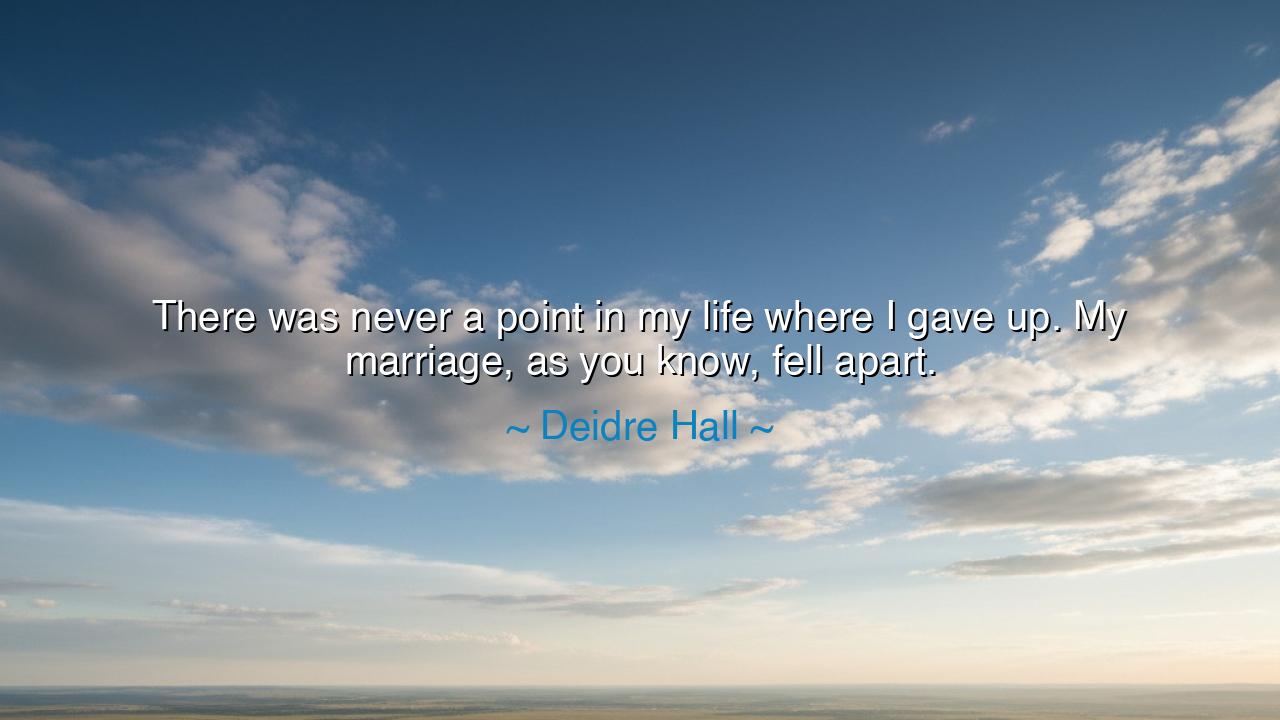
There was never a point in my life where I gave up. My marriage
There was never a point in my life where I gave up. My marriage, as you know, fell apart.






In the heartfelt confession of Deidre Hall, we hear the voice of a soul tempered by trial yet unbroken: “There was never a point in my life where I gave up. My marriage, as you know, fell apart.” These words, though simple, carry the weight of a life lived with courage—the courage not to be defined by loss, nor to let sorrow drown the spirit’s fire. They speak to the eternal struggle between the frailty of human bonds and the endurance of the human will. The marriage may have fallen, but the woman remained standing. And in that steadfastness lies a lesson older than time: what breaks in life is not meant to destroy us, but to reveal our strength.
Deidre Hall, known to many as an actress of grace and resilience, did not utter these words as an ornament of fame, but as an offering of truth. Behind the glamour of her career stood a woman acquainted with heartbreak—the dissolution of love, the crumbling of promises once thought eternal. Yet she insists: “I never gave up.” In that refusal, she joins the lineage of countless souls who have faced the ruins of their lives and chosen to rebuild rather than surrender. Her words are not of bitterness, but of resolve—a declaration that the spirit’s worth is not measured by what it keeps, but by what it survives.
In the ancient days, the philosophers and poets spoke of fortitude as the noblest of virtues. They knew that pain, like fire, tests the purity of one’s essence. The Stoic sage Epictetus taught that no calamity can truly harm a person who governs their own heart. So too does Hall remind us that though marriage—that most sacred of human covenants—may falter, the individual must not. For love is not only what we give to another; it is also what we owe to ourselves. To endure is not to deny pain, but to embrace it as proof of one’s continuing life.
Consider the story of Cleopatra, the last queen of Egypt. Betrayed, besieged, and facing the end of her kingdom, she refused to bow to despair. Though her reign fell, she carried herself with unshaken dignity, turning even her downfall into legend. Like Hall, she could have surrendered to the bitterness of loss—but she chose instead to meet the ruin of her world with defiance and grace. For those who endure the collapse of what they once held sacred, this is the heroic act: not to escape suffering, but to transform it into a testament of one’s spirit.
Failure, in truth, is not the end—it is the unveiling of who we are without the scaffolding of comfort. A marriage may fall apart, a dream may fade, a season of joy may wither; yet if the soul endures, it gathers wisdom like gold refined in flame. Hall’s words shine with this quiet victory. Her life did not escape pain, but it transcended it. In every life there comes a moment when what we have built falls into silence—and in that silence, we must decide whether to curse the loss or to begin anew. Those who never give up become architects of their own rebirth.
There is also a sacred tenderness in her admission. To speak of failure without shame, to claim it as part of one’s truth, is itself an act of courage. The ancients called this aletheia—truth revealed through struggle. In acknowledging that her marriage fell apart, Hall does not confess defeat; she claims her humanity. For no heart can love deeply without the risk of breaking, and no soul can grow without the tearing of its roots. Thus, her words become not lamentation, but liberation—a reminder that to live fully is to risk fully, and to love without fear is to live without regret.
The lesson, then, is clear and luminous: never surrender the light within you to the darkness around you. Life will take much—relationships, certainty, dreams—but what it cannot take is the will to rise again. When all that you have known collapses, stand as Deidre Hall stood, and say, “I did not give up.” For perseverance is the bridge between loss and renewal, the sacred fire that turns endings into beginnings.
So let these words echo across the generations: Do not fear the falling apart of things. Fear only the surrender of your soul. Love, when it fails, leaves behind not emptiness, but the seed of wisdom. Let it teach you, shape you, and lead you to greater depths of compassion. And when the storms of life come—as they will—remember Hall’s quiet vow: that to live with strength is not to avoid pain, but to face it with the unbroken heart of one who still believes in dawn after darkness.






AAdministratorAdministrator
Welcome, honored guests. Please leave a comment, we will respond soon